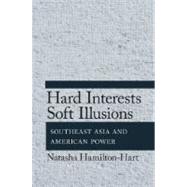Hard Interests, Soft Illusions
, by Hamilton-Hart, Natasha- ISBN: 9780801450549 | 0801450543
- Cover: Hardcover
- Copyright: 2/28/2012
In Hard Interests, Soft Illusions, Natasha Hamilton-Hart explores the belief held by foreign policy elites in much of Southeast Asia-Indonesia, Malaysia, the Philippines, Thailand, Singapore, and Vietnam-that the United States is a relatively benign power. She argues that this belief is an important factor underpinning U.S. preeminence in the region, because beliefs inform specific foreign policy decisions and form the basis for broad orientations of alignment, opposition, or nonalignment. Such foundational beliefs, however, do not simply reflect objective facts and reasoning processes. Hamilton-Hart argues that they are driven by both interests-in this case the political and economic interests of ruling groups in Southeast Asia-and illusions.Hamilton-Hart shows how the information landscape and standards of professional expertise within the foreign policy communities of Southeast Asia shape beliefs about the United States. These opinions frequently rest on deeply biased understandings of national history that dominate perceptions of the past and underlie strategic assessments of the present and future. Members of the foreign policy community rarely engage in probabilistic reasoning or effortful knowledge-testing strategies. This does not mean, she emphasizes, that the beliefs are insincere or merely instrumental rationalizations. Rather, cognitive and affective biases in the ways humans access and use information mean that interests influence beliefs; how they do so depends on available information, the social organization and practices of a professional sphere, and prevailing standards for generating knowledge.






